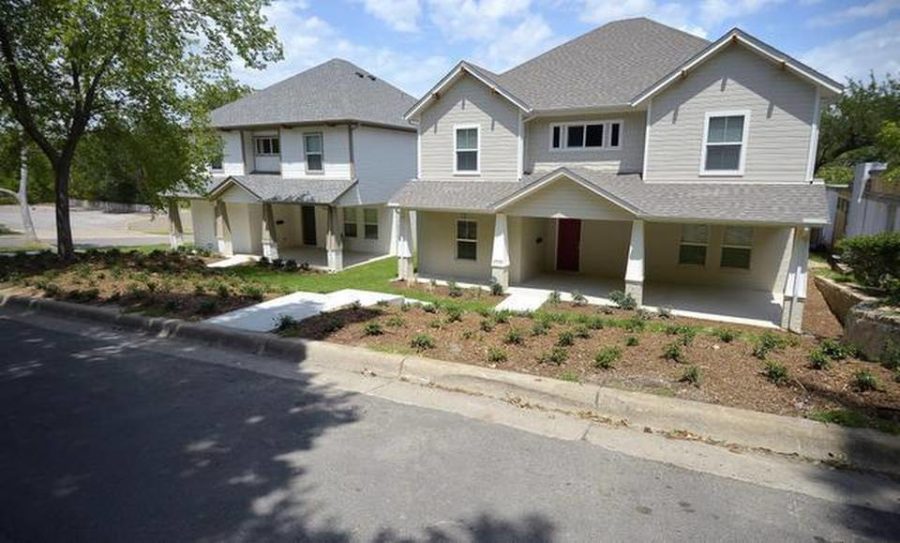New proposed zoning definitions would severely limit students’ off-campus living options, according to Student Body President Maddie Reddick. The definitions are part of an amendment to the City of Fort Worth Zoning Ordinance regarding owning or renting houses. The Zoning Commission will vote Wednesday at 1 p.m. on the amendment. Their recommendation will go to the City Council, which will vote on Oct. 13. The draft of the amendment adds a definition for “single housekeeping unit,” a term found in the definition for “family.” The proposed definition for “single housekeeping unit” involves individuals who “share a lease agreement or own the property, jointly use common areas, interact with each other, and share the expenses for food, rent or ownership costs, utilities and other household maintenance costs and activities.” In addition, this definition contains four presumptions that cannot be true for any resident of the house:
- Keyed or deadbolt lock(s) on any interior door(s);
- Members of the household significantly change over the course of a 12-month period by losing or gaining members;
- One or more of the members of the household has a different address for the purpose of voter registration, driver’s license, motor vehicle registration or filing of taxes; or
- The association of the members of the household is temporary or seasonal or the sharing of a dwelling unit is merely for convenience and economics.
If any of the presumptions apply to any resident, the residents wouldn’t be functioning as a single housekeeping unit and therefore would be unable to rent or own a house, according to the amendment. If it passes, students won’t be able to rent houses off-campus unless they comply with the new restrictions, Reddick said. They would then have to rent apartments or duplexes for off-campus housing. Out of 8,647 undergraduate students enrolled in fall 2014, about 54 percent were from Texas and about 45 percent were out-of-state or international students, according to the TCU Office of Institutional Research. Additionally, over half of the 1,891 first-year students enrolled last fall were out-of-state or international students. Less than a third of the 44 percent from Texas came from Fort Worth ISD or other Tarrant County schools. As a result of the TCU Residential Overlay last year, the number of unrelated persons allowed to live in a single-family home in the TCU area has been lowered to three. As of November 2014, 48.3 percent of students were housed on campus, with the remaining living off campus, according to a Zoning Commission ordinance. A mediation group raised the issue of clarifying housing terms to the city last fall, said Dana Burghdoff, the assistant director of Planning and Development for Fort Worth. The group had met to discuss housing issues with the overlay. The amendment of added and revised definitions was proposed in July as a solution to the confusion. The city’s legal department wrote the definitions, she said. Previously, the Code Compliance and Planning and Development/Zoning staff would determine the definitions of a “family” and a “single housekeeping unit” when a question arose, said Jocelyn Murphy, planning manager for the Zoning Commission. Murphy said the legal department researched the “single housekeeping unit” policies of other cities with and without universities across the country. Arlington, Dallas, Houston, Irving and San Antonio were among the cities researched, according to a list released by Burghdoff. According to Arlington’s Unified Development Code, a family is “individuals living together as a single housekeeping unit in which not more than four unrelated individuals are unrelated to the head of the household.” The Dallas City Code and San Antonio’s Codes of Ordinances state the definition of a family includes a “single-individual.” Irving’s Building Standards Code includes family as “individuals living together as a single housekeeping unit.” Houston’s Code of Ordinances didn’t have a definition of “family.” None include the four presumptions that the amendment to Fort Worth’s zoning ordinance contains. According to a presentation by the Planning and Development Department at a public meeting on Aug. 12, there are three options for the revision of a single housekeeping unit. The first option involves not adding a new definition at all. The second adds a definition with the single descriptive paragraph as mentioned above, and the third includes the four presumptions. Burghdoff said she doesn’t think the third option will pass because of the amount of opposition to the presumptions. “Pretty much every investor, owner and landlord is expressing opposition. They want to be able to rent to students and not have that become an issue,” she said. She said her department has been receiving hundreds of emails about the proposal from students, renters and landlords. “I don’t think [students] were taken into account, and I think that’s part of the problem — or the main problem,” Burghdoff said. Murphy said the Zoning Commission will take all perspectives into account with the upcoming vote. “At the end of it all, people may agree and they may not agree, but they can say that their voice has been heard,” she said. Reddick said she encourages students to email the city government, sign an online petition and attend the Zoning Commission meeting on Wednesday to voice their opinions. She will be speaking at the meeting, she said. “I think this is a fight that’s never going away,” Reddick said.




